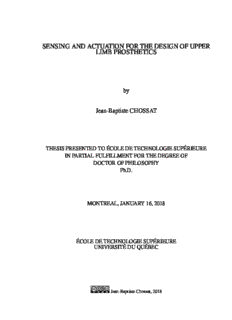Table Of ContentSENSING AND ACTUATION FOR THE DESIGN OF UPPER
LIMB PROSTHETICS
by
Jean-Baptiste CHOSSAT
THESIS PRESENTED TO ÉCOLE DE TECHNOLOGIE SUPÉRIEURE
IN PARTIAL FULFILLMENT FOR THE DEGREE OF
DOCTOR OF PHILOSOPHY
Ph.D.
MONTREAL, JANUARY 16, 2018
ÉCOLE DE TECHNOLOGIE SUPÉRIEURE
UNIVERSITÉ DU QUÉBEC
Jean-BaptisteChossat,2018
This Creative Commons license allows readers to download this work and share it with others as long as the
authoriscredited. Thecontentofthisworkcannotbemodifiedinanywayorusedcommercially.
BOARDOFEXAMINERS
THISTHESISHASBEENEVALUATED
BYTHEFOLLOWINGBOARDOFEXAMINERS
M.VincentDuchaine,ThesisSupervisor
Départementdegéniedelaproductionautomatisée,ÉcoledeTechnologieSupérieure
M.Yong-LaePark,Co-supervisor
DepartmentofMechanicalandAerospaceEngineering,SeoulNationalUniversity
M.HandyFortin-Blanchette,PresidentoftheBoardofExaminers
Départementdegénieélectrique,ÉcoledeTechnologieSupérieure
M.GuyGauthier,Memberofthejury
Départementdegéniedelaproductionautomatisée,ÉcoledeTechnologieSupérieure
M.AlexisLussierDesbiens,ExternalIndependentExaminer
DépartementdeGéniemécanique,UniversitédeSherbrooke
THISTHESIS WASPRESENTEDANDDEFENDED
INTHEPRESENCEOFABOARDOFEXAMINERSANDTHEPUBLIC
ON"NOVEMBER17,2017"
ATÉCOLEDETECHNOLOGIESUPÉRIEURE
ACKNOWLEDGEMENTS
Wehavetwolives,andthesecondbegins
whenwerealizeweonlyhaveone.
Confucius
First and foremost, I’d like to thank my family. Thanks for giving me the inspiration and the
ability to go live abroad, and thanks for welcoming me when I come back. You can be sure
that, if all else fails, you will always get me back with french food, nice weather, and a little
offtimetoreadabook.
We all know that if the words "french connection" were not associated with either a fashion
clothing retail store or a drug smuggling circuit, it would most certainly be used to describe
the current state of the french immigration in Montréal. I am no different from my other com-
patriots and, I have a bunch of French and French related persons to thank. Thank you Paga,
Lauranne and Bohort, Thomas, Marion, Pierre and Laura, Lucille, Kim and Séàn, Bé, Laeti,
and Stéph. To those of us that went back to France and will give us reasons to visit: thank
you Lucie and Loki, Séb and Axelle, Alex and Perrine. Thank you guys for all the cooking,
drinking,watchingmovies,playingvideogames,playingboardgames,goofingaround,speak-
ing about politics or surviving in the cold. And most importantly, thank you all for being my
friendsalthoughIwon’tchatwithyouonmylatestsmartphone.
Researchoriginatesfromassiduousandcreativepeople,instimulatingenvironments. Assuch,
I must thanks my colleagues, friends, and minions of the CoRo lab. Together, we devised
experimentsthatinvolvedfood,highvoltages,lasers,chairpushingrobots,homebrewedbeer,
positive reinforcement and many many cookies. Thank you Reza, Axay, David, JS, Etienne,
Deen, JP, Rachid, Kate, Alexandre, Loan, Alexis and Jen. Of course, a special thanks to
Vincent for patiently letting me try, explore, and often fail, for discussing about many other
thingsthanresearchandneverbeingtooserious. Thesepastfewyearshavebeenablast.
VI
AsidefromstudyinginMontréal,myPhd. alsobroughtmetoPittsburghforafewmonth. First
andforemost,thankyouYong-Laeforwelcomingmeinthelab,and,moreimportantly,thanks
also for the time meticulously revising the papers, introducing me to soft sensing, conductive
liquids, and overall trusting me in the lab. Thanks also to my lab mates Celeste, Jackson,
Andrew, Hee Sup and Yiwei, who made this experience very appreciable. I am sure our path
willcrossagain,onewayoranother.
Althoughsomemayarguewithme,IwillsubmitthatI(mostly)keptsaneduringthesesixyears
of research. I could not have done that without the people of the ICSA and I, quite simply, do
not have the words to express my gratitude. Thank you Darren, Giordi, Alexandrina, Rosie,
David, JF, Ian, Gab and Mia. Thanks also to our international members Elisa, Daniel and
Christian. And of course, a huge thanks to Kevin for I have very rarely met this strange mix
of open mindedness, critical thinking, incredible knowledge and raw grit. All of you guys
inspired me to be a better person on many levels, and I have absolutely no doubt we will meet
againinthefuture.
MESUREETACTIONEMENTDANSLECADREDELACONCEPTIONDE
PROTHÈSESDEMEMBRESSUPÉRIEURS.
Jean-BaptisteCHOSSAT
RÉSUMÉ
Cettethèseaeupourobjectifl’améliorationdesprothèsesdemembresupérieur. Pourcefaire,
et en se basant sur les besoins reportés par les utilisateurs, nous avons ciblés deux aspects
principauxdesprothèsescontemporaines: lessensationsetl’actionnement.
Le rétablissement des capacités prioprioceptives au travers d’uns membre artificiel est vitale
pour leur contrôle instinctif et précis. Dans le but de mesurer la position des prothèses, nous
avons conçu des capteurs microfluidiques souples utilisant des liquides conducteurs, comme
l’alliage eutectique de Gallium et d’Indium (eGaIn) ou les liquides ioniques à température
ambiante (RTIL), scéllés dans un élastomère de faible raideur. Ces capteurs ont été utilisé
tout d’abord pour mesurer des étirements unidirectionels, puis des forces normales grâce à
l’utilisationdel’imagerieparimpédancetomographiquedansunepeausouplemicrofluidique,
et finalement intégrés dans une peau artificielle souple qui a été utlisé pour mesurer les mou-
vementsd’unemainhumaine.
Les actionneurs electromagnétiques conventionels sont peu adaptés à l’actionnement des pro-
thèses. Les tâches de préhension necessite typiquement un couple fort à faible vitesse, tan-
dis que les actionneurs conventionels sont conçus pour être efficaces à hautes vitesses. En
conséquence, nous avons conçu l’actionneur à "Aimants Permanents Programmable" (PPM).
Cet actionneur unique, basé sur la magnétisation d’aimants permanents par des impulsions
de courant, est capable de soutenir un torque conséquent à une vitesse nulle et sans aucune
dépense énergétique. Pour cette raison cet actionneur est particulièrement adapté pour des
tâchescommelapréhensionoulamarche,etreprésenteunnouveautyped’actionneurelectro-
magnétique qui permettra un actionement efficace, dans des conditions de couple élevé et de
bassevitesse,pourdesapplicationsdetyperobotiquesetprothétiques.
Mots-clés: Prothèse de Membre Supérieur, Capteur Microfluidique, eGaIn, Liquide Ionique
àTempératureAmbiante,Actioneur,Préhension
SENSINGANDACTUATIONFORTHEDESIGNOFUPPERLIMBPROSTHETICS
Jean-BaptisteCHOSSAT
ABSTRACT
The objective of this thesis has been to improve upper limb prosthetics. With this aim in
mind, and based on reported user needs, we targeted two main aspects of contemporary active
prosthetics: sensingandactuation.
The restoration of proprioceptive capabilities through the artificial limb is vital for their intui-
tive and precise control. In order to capture the prosthetics position, we designed extremely
soft microfluidic sensors using conductive liquids such as eutectic Gallium Indium (eGaIn) or
RoomTemperatureIonicLiquid(RTIL)embeddedinsoftelastomers. Thesesensorswereused
first to sense unidirectional strain, then normal force through Electrical Impedance Tomogra-
phy (EIT) in a soft microfluidic skin, and were finally embedded in a soft artificial skin that
wasusedtomeasurethehumanhandmotion.
Conventional electromagnetic actuators are poorly suited for prosthetic actuation. Grasping
tasks typically require large torque at low speeds whereas conventional actuators are designed
to be efficient at high rotational speeds. In consequence, we designed the "Programmable
Permanent Magnet" (PPM) actuator. This unique actuator, based on the magnetization of per-
manent magnets by current pulses, is able to maintain a large torque at no speed and for no
energeticcost. Thisactuatorisespeciallysuitedfortaskssuchasgraspingorwalkingandrep-
resents a new type of electromagnetic actuator that will enable efficient low speed high torque
efficientactuationforroboticandprostheticapplications.
Keywords: Upper Limb Prosthetic, Microfluidic Sensor, eGaIn, Room temperature Ionic
Liquid,Actuator,Grasping.
Description:Interconnects for microfluidics . over the previous design, we used a low conductive RTIL in concert . Manual extrusion was attempted using needless syringes but A silicon-based galinstan magnetohydrodynamic pump.

